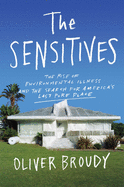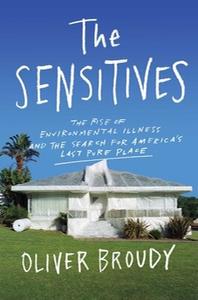
 Brain fog, muscle aches, memory loss and a general malaise are a handful of the symptoms that might present in a person suffering from environmental illness. They precipitate from exposure to any number of chemicals common to modern society: pest sprays and fragrances, cleaners and inks. Yet the debilitating condition is hotly contested within the study of medicine, as freelance journalist Oliver Broudy uncovers in the thoroughly engaging investigation The Sensitives: The Rise of Environmental Illness and the Search for America's Last Pure Place.
Brain fog, muscle aches, memory loss and a general malaise are a handful of the symptoms that might present in a person suffering from environmental illness. They precipitate from exposure to any number of chemicals common to modern society: pest sprays and fragrances, cleaners and inks. Yet the debilitating condition is hotly contested within the study of medicine, as freelance journalist Oliver Broudy uncovers in the thoroughly engaging investigation The Sensitives: The Rise of Environmental Illness and the Search for America's Last Pure Place.
Broudy was already well into his research when one of his subjects, Brian Welsh, disappeared. An integral member of the EI community, or sensitives, Welsh had cultivated an online presence that rallied and bolstered those like him, who exist in a world skeptical of their claims, with families unwilling to understand and doctors convinced their pain is psychogenic. Welsh's sudden absence sounds alarms across the message boards, and prompts Broudy to link up with James, a conspicuously wealthy sensitive, for a capricious road trip into the American Southwest, its arid remoteness popular among sensitives.
The problem, as it becomes clear, is the preponderance of toxic chemicals scattered on the winds of progress. Early on, Broudy notes that 3.9 billion pounds of the stuff were released in the U.S. in 2017 alone, and he places similar figures alongside exorbitant increases in cancer rates. Yet, he tempers these staggering numbers with a self-effacing caveat: "Sure, much of what I'm saying here is the same sort of thing you might find in a number of overwrought books about chemicals and the environment. But I swear I'm trying to be clear about it. I am trying to be sane." It's in that spirit that Broudy threads the history of chemical production into his narrative, beginning with the accidental discovery of synthetic dyes.
Sanity is the flashpoint in the conflict between patients seeking relief from their pain and the doctors who can find no biological cause for it and so dismiss it as psychogenic--a real pain, but one produced by the mind, to be treated psychologically rather than pharmacologically. This leads Broudy down another road through the past: the winding route medicine has often taken from ignorance to expertise, with numerous detours through quackery.
Broudy's momentum rarely flags as he whirls between empathy and skepticism. Neither an invective of medical politics, nor a sideshow of eccentric recluses, The Sensitives pleads for understanding in a fight over a syndrome not yet understood. --Dave Wheeler, associate editor, Shelf Awareness
Shelf Talker: A journalist and his wealthy interview subject take an audacious road trip through the history of medicine and chemicals in search of answers about a mysterious and growing affliction.

